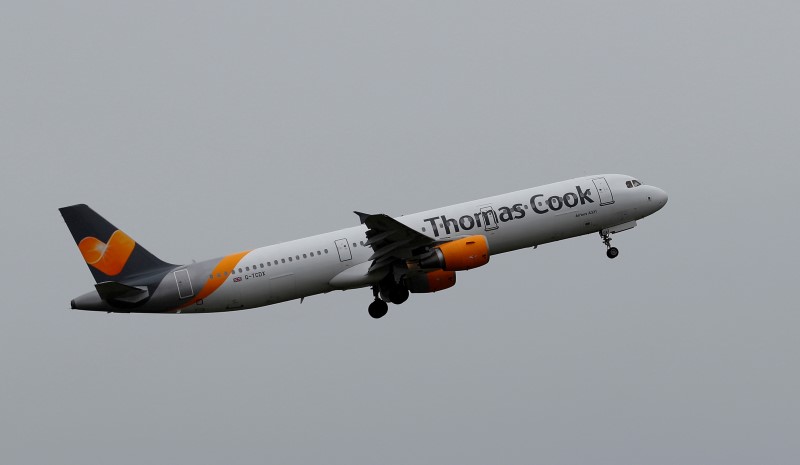By Paul Sandle
LONDON (Reuters) - Airlines, holiday companies and housebuilders joined British banks in bearing the brunt of Brexit-induced market turmoil on Monday, which analysts said reflected expectations Britain was headed for recession following its vote to leave the EU.
The FTSE 250 index (FTMC), which is more closely aligned to the British economy than the multi-national heavy FTSE 100 (FTSE), was down 12.8 percent in the two days of trading since Thursday's vote.
The FTSE 100 was down 5.2 percent, while sterling tumbled to a fresh 31-year low against the dollar and British 10-year government borrowing costs sank below 1 percent for the first time, as investors seek a respite from turbulent markets.
"UK lead indicators are already consistent with a recession and will likely now worsen," Credit Suisse (SIX:CSGN) European equity strategist Andrew Garthwaite said.
Globally the vote wiped $2.08 trillion off equity markets on Friday, the biggest daily loss ever.
British employers' group the Institute of Directors reported that a quarter of its members would put a freeze on recruitment and 5 percent would make redundancies.
Its snap reaction survey of 1,092 members also found 22 percent of companies were considering moving some of their operations outside the United Kingdom, whereas only 1 percent said they would bring operations back.
"A majority of business leaders think the vote for Brexit is bad for them, and as a result plans for investment and hiring are being put on hold or scaled back." IoD Director General Simon Walker said.
Prime Minister David Cameron, business leaders, economists and politicians from U.S. President Barack Obama to China's President Xi Jinping had urged Britons to stay in the 28-member bloc to protect global markets, trade and political stability.
EMPLOYMENT FEARS
Housebuilders were amongst the worst hit stocks, with the two biggest firms Barratt (L:BDEV) and Persimmon (L:PSN) both losing 39 percent of their market value over the two days.
Canaccord analyst Aynsley Lammin said they were being dragged lower by fears that the British economy could tip into recession, leading to job losses and a seizing up of the housing market.
Scotiabank economist Alan Clarke said he had downgraded his forecast for 2017 growth to zero from 2 percent.
"It could be deeper, I could be overly harsh, but I suspect we will have a recession," he said, explaining that there were risks to consumer spending - the driving force of the economy at the moment - and investment.
Shares in British banks also plunged on Monday over the fall out from the shock result of the vote.
Fears about currency weakness and job security also hit airlines and travel stocks, with shares in hoteliers, airlines and tour operators falling further on Monday after tumbling on Friday.
The International Air Transport Association predicted the number of air passengers could be 3-5 percent lower as a result of economic weakness following the vote. It said the EU was easily the biggest destination market from Britain, accounting for 49 percent of passengers.
The impact is expected to be particularly pronounced for carriers such as easyJet (L:EZJ), down 21 percent, and Ryanair (I:RYA), which are predominantly focussed on European markets.
IAG (L:ICAG), comprising British Airways, Iberia, Vueling and Aer Lingus, already warned on profit on Friday due to expected lower demand for travel.
Brexit also calls into question EU agreements on open airspace that have fostered a huge expansion of air travel, creating uncertainty for both British and other EU airlines.
Shares in holiday group Thomas Cook were trading down 3.4 percent after closing down 16 percent on Friday, both hurt by the prospect of an economic downturn and the sharp drop in the pound making summer holidays on southern European beaches more expensive.
TUI Group, Europe's largest tour operator, is also expecting a hit due to the effect of translating from pounds to euros for its profit and loss account.
However, CFO Horst Baier said he doubted whether a sustained weakening of the pound would dampen Brits' enthusiasm for travel.
German daily Bild had over the weekend predicted that economic weakness in Britain following Brexit could mean fewer Britons fighting for space with Germans in popular Spanish beach resorts and lead to lower prices for trips.

